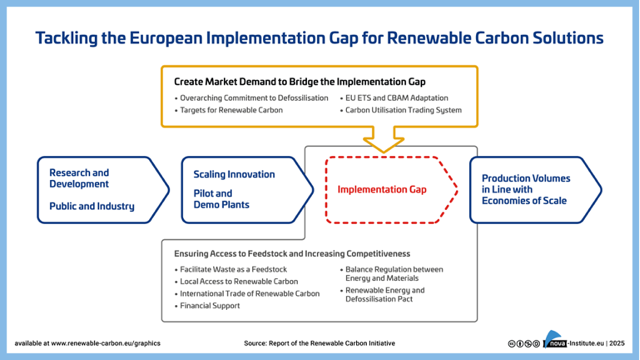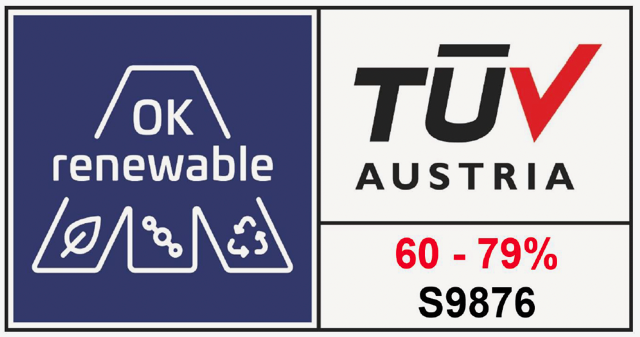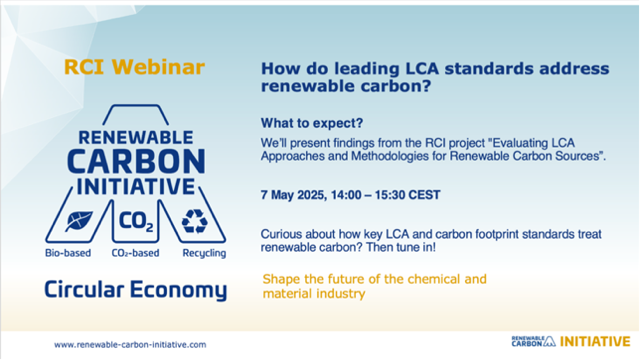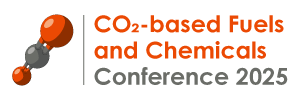Monthly news from the Renewable Carbon Initiative (RCI), April 2025
Let's take a look at what happened in April 2025 at RCI:
Welcome to the April edition of RCI’s monthly news! This month, we are happy to share two particular milestones with you: First, RCI published a key report on “Policy Proposals for Facilitating the Transition to Renewable Carbon” – right on time for the many EU policy initiatives – and second, we celebrate the launch of TÜV Austria’s new label “OK renewable,” designed to easily identify renewable content in products. Additionally, we have released several supplementary documents supporting our joint report with BIC. Inside this issue, you will also find highlights from the CO₂-based Fuels and Chemicals Conference in Cologne and an RCI interview of our member Fibenol (EE). Looking ahead, mark your calendars for two RCI webinars scheduled for May, zooming into our recent LCA and Biomass availability modelling studies – don’t miss out to register now!

1) Publication of “Policy Proposals for Facilitating the Transition to Renewable Carbon”
On 16 April 2025, RCI published their latest scientific background report “Policy Proposals for Facilitating the Transition to Renewable Carbon”. The report outlines a strategic roadmap for transforming Europe’s chemical industry by transitioning from fossil-based to renewable carbon sources. It highlights the industry’s current crisis which is driven by global competition, high energy costs, and regulatory pressure, and stresses the urgency of reducing dependence on fossil feedstocks. The report argues that the transition to renewable carbon is not just about environmental sustainability; it is about securing Europe’s industrial future and maintaining its global competitiveness in a rapidly changing world. By pioneering renewable carbon technologies, the EU can unlock economic benefits and unleash its innovation potential while advancing climate neutrality ambitions.
The report outlines ten comprehensive policy proposals including mandatory renewable carbon targets, adaptation of emissions trading systems, and financial support mechanisms. These proposals aim to create market demand, drive innovation and build industrial resilience. Key enablers include harmonised standards, robust certification, infrastructure development, and stakeholder engagement.

The set of proposals has been developed over many months, both actively within RCI but also through feedback and input by many external stakeholders. We believe these proposals can actively help to shape policy in a way that enables sustainability, competitiveness and resilience through defossilisation – and helps to tackle the implementation gap from fossil-free innovation to market-ready product.
For more information, please take a look at the press release and LinkedIn post.
Find the full report here: https://renewable-carbon.eu/publications/product/rci-policy-proposals-for-facilitating-the-transition-to-renewable-carbon-pdf/

2) Market Launch – TÜV Austria’s “OK renewable” Certification Scheme
While we already informed you about the market launch of TÜV Austria’s “OK renewable” certification scheme in the March newsletter, we wanted to highlight again that the label is now officially available on the market.
TÜV Austria supported the market launch with a press release and news post, and you can find all relevant information about the certification in the doc center on the official website: https://okcert.tuvaustria.com/doc-center/
3) Publication of additional background documents for the BIC/RCI biomass modelling project
These additions respond to frequent questions around assumptions, calculations, and deeper insights into agriculture and forestry.
Find the documents here:
- https://renewable-carbon.eu/publications/product/background-document-to-rci-bic-report-is-there-enough-biomass-to-defossilise-the-chemicals-and-derived-materials-sector-by-2050-pdf
- https://renewable-carbon.eu/publications/product/a-deep-dive-into-the-agriculture-sector-is-there-enough-biomass-to-defossilise-the-chemicals-and-derived-materials-sector-by-2050-pdf
- https://renewable-carbon.eu/publications/product/a-deep-dive-into-the-forestry-sector-is-there-enough-biomass-to-defossilise-the-chemicals-and-derived-materials-sector-by-2050-pdf
4) Webinar: How Leading LCA Standards Address Renewable Carbon - An RCI Study

On 12 March, RCI released an extensive study examining how prominent LCA standards address renewable carbon, including guidance, considerations for end-of-life scenarios, and a non-technical summary tailored for policy makers.The final publication is a three-part study, with an exhaustive, rather technical document on frameworks and guidance (Report 1), a focused deep-dive into the topic of renewable carbon in recycling situations (Report 2) and a non-technical summary for everyone who is not an LCA expert (Report 3).
To help share and explain the findings of this study, we invite you to a 90-minute webinar presenting its key outcomes. The webinar will focus on reviewed LCA frameworks, highlighting areas of convergence (such as biogenic carbon accounting) and divergence (such as substitution credits or provisions for the application of economic and mass allocation), and aims to provide an overview of provisions and gaps in existing LCA standards and frameworks.
The webinar is scheduled for 07 May 2025, 14:00–15:30 CEST.
5) Joint BIC and RCI Report “Is there Enough Biomass to Defossilise the Chemicals and Derived Materials Sector by 2050?”
A second, deep-dive webinar
In February, RCI published a joint study with the Bio-based Industries Consortium (BIC) which modelled biomass availability in Europe and explored the critical question for the future of sustainable materials:
Can agricultural and woody biomass together sustainably meet 20% of the global carbon demand of the chemical and derived materials industries by 2050 – up from 5.5% (EU27) and 10% (global) in 2023?
Due to high interest, Michael Carus (CEO, nova-Institute) and Olaf Porc (Economy & Policy Department) are hosting a second webinar for an in-depth presentation of the study’s findings on 26 May 2025, from 14:00 to 16:00 CEST
The webinar will provide detailed insights into the methodology, modelling assumptions, and key conclusions of the study. Most notably, the analysis demonstrates that meeting 20% of the global carbon demand for chemicals and derived materials from biomass by 2050 is both technically feasible and environmentally sustainable.
Participants can look forward to a thorough discussion of the study’s implications for industry, policy, and the transition toward a circular, bio-based economy.
Access the full study here.

6) RCI Member Interview with Fibenol
We recently sat down with Peep Pietk, Chief Development Officer at Fibenol, for a deep dive into how the company is redefining what's possible in the bioeconomy.
Highlights from the interview:
- Fibenol enhances resource efficiency, reduces reliance on fossil-based chemicals and creates new value chains
- 90% of biomass (cellulose, lignin, and hemicellulose) is converted into high-value biomaterials
- Products designed to replace fossil-based chemicals across industries
- Transparent environmental data through EPDs
As an RCI member, Fibenol brings not just cutting-edge technology, but also advocacy for harmonised policy, better funding tools, and clearer public messaging to accelerate the transition to renewable carbon.
Read the full interview here: https://renewable-carbon-initiative.com/network/fibenol/
If you are interested in an interview about your company, please contact us. We will be happy to send you questions tailored to your company.
7) Selected ambassador activities
02 April 2025, Biopolymers and Beyond, Vienna: Christopher attended a presentation on the future of sustainable plastics.
03 April 2025, UFOP meeting on economy and markets
In Berlin, we were invited by the Union for the Promotion of Oil and Protein Crops to bring our latest publications to the meeting and discuss recent developments in policy, impacts of e.g. the Ukraine war, China as an exporter of liquid bioenergy, RED III and aviation / maritime sectors, demand and supply, and other topics.
29 to 30 April, CO2-based Fuels and Chemicals Conference (CCU) 2025 in Cologne
Upcoming: 03 May, Workshop on the Bioeconomy Strategy Update
Hosted by DG GROW and DG ENV, we have been actively invited to join on a strategic workshop to discuss the planned update of the Bioeconomy Strategy.
8) Partner events: CO2-based Fuels and Chemicals Conference (CCU) 2025 – 29-30 April 2025, Cologne

The 13th CO2-based Fuels and Chemicals Conference took place on 29 and 30 April 2025 in Cologne with 222 participants from 27 countries. During these two days, international experts presented innovations in CCU, green hydrogen and Power-to-X showcasing the latest innovations and most important developments in the fast-growing field of Carbon Capture and Utilisation with plenty of opportunities to network.
Michael Carus from nova-Institut GmbH opened the conference presenting “CCU in the Wider Context of Sustainability and Policy” highlighting key findings of RCI publications.
By 2050, 25–30% of global demand for chemicals and materials could be met with CO₂-based sources. Today, more than 1.5 million tonnes of CO₂-based products are already being produced annually – a sign that commercialisation is no longer a distant goal. The momentum is real.
More than 70 companies and 110 EU-funded projects are already actively developing CO2capture, conversion and integration solutions.
However, scaling CCU depends on the right political framework, reliable CO₂ supply, renewable energy and green hydrogen as well as cross-sector collaboration.
The "Best CO₂ Utilisation 2025" Innovation Award won UP Catalyst (EE) for its battery-grade graphite from CO2. Second place took Far Eastern New Century (FENC) for its TopGreen CO₂-Based NIPU. RCI member Oxylus Energy took third place for its methanol producing electrolyser. This exciting award sponsored by YNCORIS, co-organised by CO2 Value Europe and nova-Institut honours innovators in the field of CCU.
Find out more: https://co2-chemistry.eu
Source: Renewable Carbon Initiative (RCI), original text, 2025-05-06.
